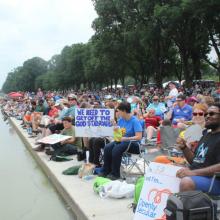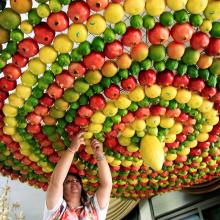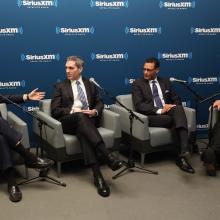Jews
Imagine receiving this message on your voicemail: “Dear Mr. Gonzalez, we regret to inform you that your heart surgery has been canceled. The medical professionals scheduled to perform it, Doctors Sarna and Latif, have discovered that they have serious disagreements about Middle East politics. Consequently, they are refusing to work together. We will do our best to find you other doctors, before your condition becomes fatal.”
Seem far-fetched? In my mind, it is the logical outcome of the manner in which many Jewish and Muslim groups have chosen to engage each other in recent years. Or, rather, not engage.
When President Obama signed a newly strengthened international religious freedom act on Dec. 16, the intention was to protect religious believers around the world.
But the freshly signed act is being heralded by some legal scholars as a different milestone — for the first time, atheists and other nonreligious persons are explicitly named as a class protected by the law.
The American Civil Liberties Union collected more than $11 million and 150,000 new members. The Southern Poverty Law Center’s Twitter account gained 9,000 followers. And the Anti-Defamation League, which fights anti-Semitism and other bigotries, saw donations increase fiftyfold.
In the days since Donald Trump won the presidency, these spikes, in support for groups that defend religious and other minorities, speak to a fear that the president-elect will trample on their rights — or at least empower those who would.
I fear now, as I have feared for months, the impact of his presidency on vulnerable people — including the white and working-class voters in places like my home state of Ohio who lent him their support.
Christians always have disagreements about policy proposals or party platforms during election seasons. But this year, I wonder how white Christians who read the same Scriptures and hold many of the same beliefs that I do could support a man who in word and deed has flaunted the core teachings of our faith.
We write to you on All Saints Day to update you on the situation in Iraq. Remembering the Christians who were killed in 2009 while attending Mass at Our Lady of Deliverance Church in Baghdad. That was the beginning of harder times to all Christians in Iraq.
It has been two years and four months since we left Nineveh Plain. It has been long time of displacement, of humiliation, of exile. However, people always lived in hope of God’s mercy to return and go back home. We believed that God will not fail us.
The exhibit is not intended as commentary on today’s politics, its organizers said. Work started on the project six years ago, before sharp rises in Islamophobic rhetoric and violence in the U.S. and Europe, and before Muslim immigration and culture became a flashpoint in American and European politics.
But the Smithsonian is not sorry for the timing, and hopes the exhibit can help quell fears of Islam and its followers.
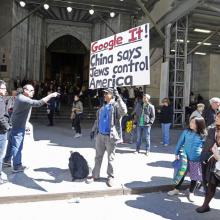
Image via a katz/Shutterstock.com
A report released on Oct. 19 by the Anti-Defamation League does not directly indict Trump for this upswing in anti-Semitism. But it explicitly connects some of his supporters to the hate speech.
“The spike in hate we’ve seen online this election season is extremely troubling and unlike anything we have seen in modern politics,” said ADL CEO Jonathan Greenblatt.
Late October is a time of colorful festivals around the world. Some mark the harvest, others are festivals of lights. Now, and in the coming weeks, Hindus, Jews, Buddhists, and Yoruba are celebrating different holidays, explained here and shown in the photo essay below.
Pope Francis met with refugees and leaders of religious faiths including Christians, Jews, Muslims, and Hindus who joined him for a day of prayer for peace in Assisi, home of his namesake, the 12th-century friar St. Francis.
But it was the migrants he invited to join him for lunch on Sept. 20 who captured the headlines and illustrated the tangible impact of war and conflict.
About 40 percent of Americans say atheists “do not at all agree” with their vision of America, according to a new study from sociologists at the University of Minnesota who compared Americans’ perceptions of minority faith and racial groups.
But the study marks a grimmer milestone — Americans’ disapproval of Muslims has jumped to 45.5 percent from just over 26 percent 10 years ago, the last time the question was asked.
And “nones” — those who say they have no religious affiliation, but may also have spiritual or religious beliefs — are also unpopular. This is significant because nones now make up one-third of the U.S. population.

Image via Michele Chabin / RNS
Stuart Levy, a nurse at a Jerusalem hospital, updates his ward’s work schedule several times a week, with staffers’ vacations, birthdays and more religious holidays than many people know exist.
“We have 18 hospital beds, and on any given day we may have an Orthodox Jew next to a devout Muslim next to a Catholic next to a Druze next to a Russian Orthodox patient,” said Levy, head nurse of the oncology/hematology ward at Hadassah Medical Center-Ein Kerem. “And many of our staff are religiously observant.”

Image via alessandro guerriero/Shutterstock.com
Imagine a test on world religions that asks this question: “Who founded Christianity?”
Jesus, right? Wrong.
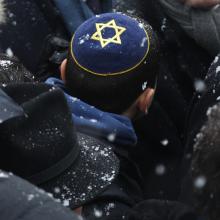
Image via REUTERS/Vincent Kessler/RNS
Claude Chiche doesn’t wear a skullcap, but he has strong opinions about them. “There are some here want to take off their kippah because they’re afraid,” said Tunisian-born Chiche, referring to the Hebrew word for yarmulke or skullcap. “But they shouldn’t accept this; they shouldn’t give in to fear.”
At a synagogue in Charleston, S.C., more than 20 years ago, teenager Rachel Nussbaum began wrapping tefillin — two black boxes attached to leather straps that Jewish men wear as they pray.
To the older Jewish men gathered for morning prayers, the sight of a woman decked out like a man at prayer was shocking. Many didn’t know what to make of Nussbaum’s brazen willingness to break with tradition.
Now 38, and a rabbi, Nussbaum leads The Kavana Cooperative, a growing Jewish prayer community in Seattle that has much in common with a synagogue but doesn’t call itself one.
Like the tefillin-wrapping teenage Nussbaum, Kavana prides itself on a reputation for doing Judaism its own way.
Is religion the cause of so much of the violence racking today’s world? Or is faith just one of many factors? Or collateral damage?
Those are tough questions, the kind that are usually posed to religious leaders, not by religious leaders.
But Cardinal Timothy Dolan wanted to switch things up on his weekly radio show, so he invited a minister, a rabbi, and an imam to tackle that issue. What sounds like the opening line of a joke was actually an in-depth discussion of “the rise of religious intolerance.”
“I don’t know if there would be anything more pertinent today, or more timely today, than religious harmony, or the lack thereof,” Dolan, the Roman Catholic archbishop of New York, said March 31 in opening a special edition of his program on the Catholic Channel of the SiriusXM network.
“The elephant in the room is that today, whether we like it or not, religion is often the cause of scandal,” he said.
“Religion is supposed to be an overwhelmingly positive force that brings people together, that increases love and understanding, human progress and human enlightenment.”
But many people today — believers and nonbelievers alike — see religion as the opposite, he said, and “that keeps the four of us up at night.”
Closer to home, one of the messages that many of us often hear is that there is slavery in the supply chains of the products that we buy every day: cotton, chocolate, produce. This can be paralyzing when we go to the mall or the grocery store. None of us want to purchase something that originates in an extreme human rights violation. But the solution cannot be simply to buy a different product. When we talk about labor trafficking, we must keep the focus on the worker who is enslaved rather than the product we consume.
As a rabbi, I know that is not my tomato or banana that is created in the image of God—it is the person who picked that product. Fighting for food justice means ensuring the human rights and wages of workers, and doing so in a way that places the needs, dignity, and expertise of the workers at the head of the table. This last piece is crucial: no one can tell us how best to solve human rights abuses in supply chains, including modern slavery, more than the workers who have the most at stake...
We must raise up the leadership of those most affected by forced labor and support their efforts to create new futures for themselves. Since 2011, T’ruah has taken more than 50 rabbis to Immokalee to learn from the CIW. The stories they hear—and the transformation they see—inspire them to go home and turn their congregations into more than just educated consumers. They become activists: they write letters to corporations urging them to join the Fair Food Program, stage protests, take Hebrew school students to meet with managers, write op-eds, and deliver sermons. Our #TomatoRabbis have become part of the larger movement of Fair Food activists, urging corporations to live up to their professed values and join the new day dawning in the Florida tomato industry that is the only proven slavery-prevention program in the U.S.
Let me tell you about a married couple. They have been together for many years. Their marriage has had some good moments, but there have also been periods of verbal and physical abuse. Finally, the wife tells her husband that she is considering leaving the marriage. She knows she has options. She can go to a shelter for battered wives, and even find her own place to live in safety and security.
As she starts her car in the garage, her husband runs after her. He drops to his knees and begs: “Please don’t go. I won’t be ‘me’ without you!”
Does she put her foot on the brake, shut off the engine and go back into the house? Does she stay in what has become a very troubled marriage?
That is precisely the question that many Jews in Europe have been asking themselves. More than 7,000 French Jews have moved to Israel in the last year, and there are clear signs others will follow.
This is huge. France has the third-largest Jewish community in the world.
A new institute in Jerusalem has been awarded $2.2 million to help Christians and Jews study Jewish texts, launching what’s being billed as a new kind of Jewish-Christian cooperation.
The Herzl Institute was awarded what’s being called the first ever multimillion-dollar grant in Jewish theology by the U.S-based Templeton Foundation, a philanthropic organization that has focused much of its giving on science-related projects. The Herzl Institute is a research institute that focuses on the development of Jewish ideas in fields like philosophy and history.
The institute is named for Theodor Herzl, considered the father of modern political Zionism, ideas that have found much support from conservative and evangelical Christians in the U.S.
Jewish and Christian collaboration has often been relegated to the political level, said Herzl President Yoram Hazony. The partnership reflects a new kind of engagement between Christians and Jews, he said.
After he said “Christians have no greater ally than Israel,” Sen. Ted Cruz, R-Texas, was heckled off the stage at a Sept. 10 gala to raise awareness of beleaguered Mideast Christians.
Cruz, the keynote speaker at the Washington, D.C., dinner, sponsored by In Defense of Christians, a new organization spearheaded by Catholic and Orthodox Christians, prompted boos and cries of “stop it!” and “enough” and “no!” as an increasingly louder crowd told him to get off the stage.
The incident, first reported by the online news organization The Daily Caller, was captured on video by EWTN, the Catholic television network. The video shows that Cruz tried to continue speaking, but many in the audience, in a hotel ballroom, expressed anger when he included Hamas in the list of militants out to destroy religious minorities in the Middle East.
According to a new survey, white evangelical Christians feel a lot of warmth toward Jews.
As for Jews, they feel colder toward evangelical Christians than they do about any other religious group.
Cue the Taylor Swift ballads: We have here a serious case of unrequited love.

